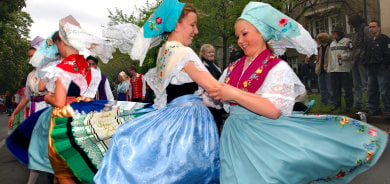At issue is funding for the Foundation for the Sorbian People, established in 1991 to support the culture, arts and language of the Slavic minority group. Organizers say that underfunding by the federal government and the state of Brandenburg – who pay for the institute together with the state of Saxony – is threatening its vitality.
But organizers also want more recognition from the federal government, and a representative in the Interior Ministry, Anja Pohontsch, a researcher with the Sorbian Institute, told The Local on Friday.
“The federal government doesn’t see itself as having that responsibility,” Pohontsch said.
Nor do organizers expect the Sorb nominated to become state premier in Saxony, Stanislaw Tillich, to become the minority group’s champion, Pohontsch said.
“We don’t want to put him under pressure like that. We don’t think it would be fair to him. He should be first of all the premier of Saxony,” she said, adding that Saxony has never tried to cut payments.
Half the foundation’s funding comes from the federal government. The other half is split between Saxony and Brandenburg proportionally according to each federal state’s Sorbian population.
About two-thirds of Germany’s estimated 60,000 Sorbs live in Saxony, and the rest live in Brandenburg, Bärbel Felber, spokeswoman for the Sorbian organization Domowina, told The Local.
Oppressed by the Nazis, pressured to conform under communist in East Germany and displaced by brown coal strip mines that have flattened more than 100 Sorbian villages since 1924, the Sorbs have a 1,400-year history in northeastern Germany, according to Domowina.
The Foundation for the Sorbian People finances research institutes, museums and language institutes as well as books, theatre and music published and produced in Sorbian dialects.
This year the group’s funding comes to a total of €15.6 million ($24.1 million) – significantly less than the €16.4 million needed to support a full range of programming, Pohontsch said. She said the federal government has said it wants to decrease its share of the funding by €100,000 each year.
A spokesman for the Ministry of Science, Research and Culture in Brandenburg said his state and the federal government have not sought to pay less in previous years, and that Brandenburg also promised to keep funding constant in the coming year.
“We not made any cuts to our funding,” spokesman Holger Drews said.
Leaders of Germany’s governing Christian Democratic and Social Democratic coalition decided to fund the group at a level of €16.4 million in 2008 and to free up an additional payment of €2.6 million, German news agency DDP reported this week. The parliamentary budget committee is expected to announce its position on the issue on June 4.
The Sorbian foundation’s organizers want a commitment to a cost-of-living increase each year.
“We would like to have a sense of long-term security,” Felber said.
Some 200 people have signed up to march down Berlin’s Unter den Linden boulevard to the Brandenburg Gate on May 29, she said.


 Please whitelist us to continue reading.
Please whitelist us to continue reading.